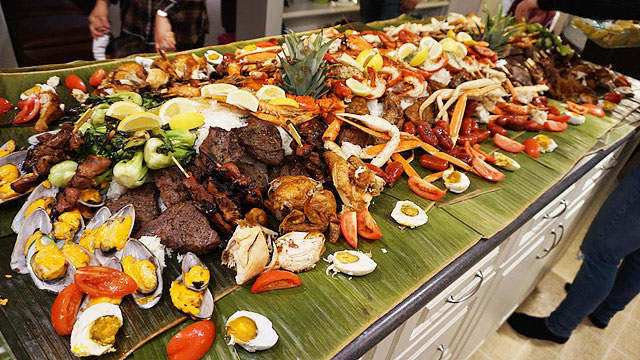Almost a year after launching a pop-up dinner series in Winnipeg showcasing Filipino food, trained chef Allan Pineda is taking his project to the next level.
Pineda started on April 25, 2016 a monthly dining event focusing on the traditional way of eating in the Philippines.
“A hand to mouth experience, no cutlery, no plates,” Pineda states on Baon Manila Nights website.
It’s the kamayan experience or eating with hands.
Kamayan is a theatre of food, with various dishes laid on banana leaves spread on a table. Diners dig in.
The Art of Kamayan is hosted at Charlee’s Restaurant and Lounge. The series is a collaboration with restaurant chef Charlie Villapando.
“Before the introduction of spoons and forks and even before the use of chopsticks Filipinos traditionally ate with their hands, and in some households, we still practice this tradition,” according to Pineda.
The Art of Kamayan follows Baon Manila Nights, a pop-up dinner series started in July 2015 by Pineda and his wife Amanda.
With Baon Manila Nights, the Winnipeg-born Pineda and other chefs take over a restaurant for monthly tastings of traditional Filipino food.
Pineda has more than 20 years in Winnipeg’s culinary scene. He was part of the teams that opened The Mitchell Block, The Merchant Kitchen, Kimchi Cafe on Albert Street, and Inferno’s on Academy.
Pineda wanted Baon Manila Nights to popularize Filipino food in Manitoba.
“Eighty thousand people or eight per cent of the population of Manitoba is Filipino, and yet we represent maybe five to 10 restaurants in the food scene,” Pineda previously told Peg City Grub, a food publication.
“It’s odd that one of the biggest minorities represents such a small speck of the food establishments when say there are maybe 150 sushi restaurants with a very small percentage of Japanese residents,” he also said.
Before the first Art of Kamayan, CBC reported on Pineda’s work. The national broadcaster quoted Pineda saying Filipino food is a “mishmash of everything”.
Pineda told CBC: “There's some Spanish food in there, there's Malaysian, there's some Chinese, there's even a little bit of Japanese.” He added that there are also hints of American influence.


